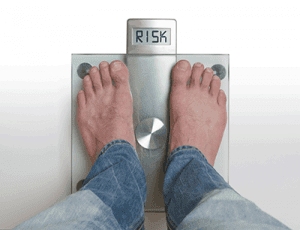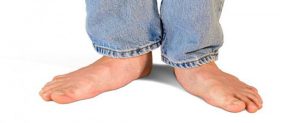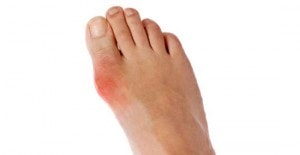As that old song goes… “the toe bone’s connected to the foot bone… the foot bone’s connected to the heel bone” and so on. Eventually, it makes its way up to the head bone, and then back down to the feet and ankles. The anatomical accuracy of that song may be dubious, but the basic theme is dead-on; in the human body, everything’s connected. And everything begins and ends with the feet.

For overweight people, the feet and ankles end up bearing the brunt of the load. So it’s not surprising that overweight and obese people are at higher risk for conditions that cause foot and ankle problems. That extra weight can make standing and walking uncomfortable and even painful. It even stretches out and wears down the connective tissue and fat pads in the feet. Being overweight changes your gait and that can screw up your arches and the tendons in your feet.
In other words, the more weight you carry, the more your feet and ankles are going to hurt. It’s not pretty.
Even a few extra pounds can be very hard on your feet
There’s no doubt that many of us carry extra weight on our frames, so the number of people who are dealing with this is pretty huge. So we asked UFAI’s Dr. Bob Baravarian about this issue and he told us something that was downright sobering. “Many people don’t realize how being overweight can impact their feet. It only takes only one pound of extra weight to add 10 pounds of additional pressure on your feet and ankles. So if you could stand to lose 10 pounds off your waistline, can you imagine how much better your feet would feel!”
Many common foot problems are made much worse by being overweight
Surplus weight exerts extra pressure on your feet, and especially on the weight-bearing joints in your feet and ankles. This pressure leads to a variety of painful foot and ankle conditions such as:
-
Flat Feet
Your foot is meant to be arched at its inner midpoint. This arching provides reflexive spring and balance. Carrying extra weight weakens the tendons and ligaments that make up the architecture of your feet and ankles. Over time, the arches will collapse, causing flat feet and often significant pain when standing and walking. Wearing orthotics can help a lot, but losing weight is the best way to see a considerable improvement in the arches of your feet.
-
Plantar fasciitis and heel pain in the morning
This condition involves inflammation of the ligaments that run forward from the heel bone to the metatarsal bones in the arch of the foot that are connected to our toes. When these ligaments are inflamed it causes heel pain and stiffness. If you are feeling sharp heel pain in the morning, or when you rise from a seated position or climb stairs, you probably have plantar fasciitis. In studying overweight patients with plantar fasciitis, researchers found obesity was the only factor that predicted whether heel pain led to disability. It’s critical that patients carrying extra weight have their heel pain treated right away.
-
Tendinitis
Tendinitis is a similar condition to plantar fasciitis. Extra pressure caused by carrying too much weight commonly leads to inflammation and pain in the tendons of the feet and ankles. This is particularly true of the Achilles tendon which connects the heel bone to the calf muscle. In overweight people, the flattening of the feet puts extra strain on the tendon and causes Achilles tendonitis.
-
Bone spurs in the feet
A bone spur is an outgrowth from a bone, created by the body to lessen the friction of two bones grinding against each other. Bone spurs are more likely to occur in someone who is overweight because of this extra stress on their joints. Obesity can make bone spurs in the feet worse adding to the symptoms, which include localized pain, stiffness, numbness, and tingling.
-
Overweight ankle pain and ankle arthritis
According to the Centers for Disease Control (CDC), one in five Americans has been diagnosed with arthritis (including both osteoarthritis and rheumatoid arthritis). However, those numbers increase to one in three among obese people. Ankle arthritis, a form of osteoarthritis, results from the breakdown of cartilage, the flexible but tough connective tissue that covers the ends of bones where they meet at joints. Simply put, the cartilage wears out. Obesity is a common contributing factor in ankle arthritis. Rheumatoid arthritis is an autoimmune condition in which the body’s immune system attacks its own joint tissue. According to the Arthritis Foundation, chemicals found in fat play a role in developing rheumatoid arthritis.
-
Gout
This condition has been called the “the king of diseases and the disease of kings”, because it was traditionally associated with a rich diet, including a lot of red meat and shellfish. Gout is caused by accumulations of uric acid crystals in joints of the feet, particularly the big toe. The pain can be so excruciating as to be disabling. If you are suffering from bouts of gout, your diet may well be the culprit.
-
Diabetes
Being overweight is a primary cause of diabetes, which in turn can damage and compress the nerves in your legs and feet along with reducing the flow of blood to your feet. Sores on the feet can easily become ulcerated and difficult to heal on their own. If you are feeling numbness in your feet be certain to see your physician. Obesity problems such as diabetic neuropathy affect millions of Americans. And every year, diabetic foot problems cause over 70,000 surgical amputations of a foot or lower leg.
-
Peripheral artery disease
Obesity problems can lead to widespread accumulations of fatty deposits in the arteries. Peripheral artery disease (PAD) may reduce blood flow to the heart and brain, as well as dramatically reduce the flow of blood to the legs and feet. As a result, it can make walking extremely difficult. Symptoms of PAD in the feet include coldness, sores that won’t heal, and feet and toes that feel numb. This is a serious complication of being overweight and suffering from obesity.
Here at UFAI, we provide curative answers to each of the podiatric problems caused by obesity, starting with basic conservative remedies and including, when necessary, surgical relief. We are here to aid the obese patient in recovering as quickly as possible to decrease their morbidity and improve their quality of life.
If you’re suffering from foot pain and complications, please don’t hesitate to make an appointment with UFAI. Our nationally recognized podiatrists offer the most advanced foot and ankle care together with the highest success rates in the nation. We are leaders in the field of research and treatment of all foot and ankle conditions.
For more information or to schedule a consultation, please call (877) 736-6001 or visit us at www.footankleinstitute.com.
- 15 Summer Foot Care Tips to Put Your Best Feet Forward - July 1, 2024
- If the Shoe Fits, Wear it… Especially for Kids Shoes! - September 4, 2023
- Is Barefoot Running Better? Or are you Running Toward Injury? - August 18, 2023
 Your foot is meant to be arched at its inner midpoint. This arching provides reflexive spring and balance. Carrying extra weight weakens the tendons and ligaments that make up the architecture of your feet and ankles. Over time, the arches will collapse, causing
Your foot is meant to be arched at its inner midpoint. This arching provides reflexive spring and balance. Carrying extra weight weakens the tendons and ligaments that make up the architecture of your feet and ankles. Over time, the arches will collapse, causing  This condition has been called the “the king of diseases and the disease of kings”, because it was traditionally associated with a rich diet, including a lot of red meat and shellfish. Gout is caused by accumulations of uric acid crystals in joints of the feet, particularly the big toe. The pain can be so excruciating as to be disabling. If you are suffering from bouts of gout, your diet may well be the culprit.
This condition has been called the “the king of diseases and the disease of kings”, because it was traditionally associated with a rich diet, including a lot of red meat and shellfish. Gout is caused by accumulations of uric acid crystals in joints of the feet, particularly the big toe. The pain can be so excruciating as to be disabling. If you are suffering from bouts of gout, your diet may well be the culprit.
Very informative article. Educating the public of the different health conditions that could possibly occur due to those additional pounds would help them be more proactive in managing their weight to prevent those unfavorable conditions. The more proactive a person is towards his health management, the better the prognosis is of having a better quality of life.
Weight management could really help manage a lot of health conditions. Making people aware of how relieving your feet and ankles from those additional weights could, in turn, relieve their suffering from gouty arthritis. Thanks for this informative post!